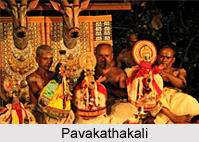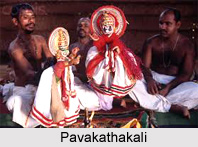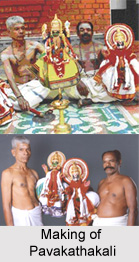 Pavakathakali is the puppet performance of Kathakali itself. This is the theatre of dolls with wooden hands and heads and of a height between 1 - 1.5 feet. The head is manipulated by inserting the middle finger into it, the hands by means of the thumb and little finger. A staging requires four manipulators who would hold the puppets overhead to perform.
Pavakathakali is the puppet performance of Kathakali itself. This is the theatre of dolls with wooden hands and heads and of a height between 1 - 1.5 feet. The head is manipulated by inserting the middle finger into it, the hands by means of the thumb and little finger. A staging requires four manipulators who would hold the puppets overhead to perform.
This form is precious to the puppeteers themselves: they are quite reticent about their art, not willing to hold an impromptu performance. Religious occasions warrant one, however. The stories from the Mahabharata comprise the repertory, to the accompaniment of the cenda drum and cymbals.
As a method of recounting stories, glove theatre, since a long time, exists almost everywhere. Various forms of puppet theatre exists in India too like; gloves, shadow and string puppets telling the folklores and local legends- from Rajasthan`s Kathputli to Kerala`s Pavakathakali. The word "Pava" actually used for puppets, katha for story and kali for play. Thus Pavakathakali becomes the puppet play of a story. The art of Pavakathakali actually dates back few centuries. Just like any other acts of the streets - the street theatre, this was primarily performed by nomadic puppeteers who would wander from village to village.
 It may have been started in Kerala by the wandering "andi pandarams" from the Indian state of Andhra Pradesh way back in the 18th century. The concept of puppet theatre got influenced by the local arts and traditions. Attakatha - texts from Kathakali - were adapted for puppet play and thus evolved the unique Pavakathakali.
It may have been started in Kerala by the wandering "andi pandarams" from the Indian state of Andhra Pradesh way back in the 18th century. The concept of puppet theatre got influenced by the local arts and traditions. Attakatha - texts from Kathakali - were adapted for puppet play and thus evolved the unique Pavakathakali.
The classical dimension is what differentiates Pavakathakali from other puppet theatres. The performances are done on ritually sanctified stages. Oil lamp "Nilavilaku" is lit and sacred hymns are chanted to create the right ambiance. Musical instruments that are used for Kathakali are used here as well - Chenda, the Changila the Ilathalam and Shankha. Usually, there is an ensemble of 5-6 persons for the performance. Unlike some puppet theatres, the puppeteers do not hide behind the screen. Traditionally, Pavakathakali was performed in houses especially during festivals such as Thiruvatira or Sivaratri, where religious observance needed people to keep awake throughout the night. The duration may vary from an hour or two or longer.
 The puppets are elaborated in `Kathakali` style with masks and colourful ornaments and embellishments such as peacock feathers. They measure anything from 30 to 60 cm. The head and arms are delicately carved in wood, painted, gilded and adorned. A cloth bag is used for the `body` that is concealed by a long, flowing robe. The puppeteer uses three fingers to manipulate the puppet- head of the puppet by index finger and the arms by thumb and middle finger.
The puppets are elaborated in `Kathakali` style with masks and colourful ornaments and embellishments such as peacock feathers. They measure anything from 30 to 60 cm. The head and arms are delicately carved in wood, painted, gilded and adorned. A cloth bag is used for the `body` that is concealed by a long, flowing robe. The puppeteer uses three fingers to manipulate the puppet- head of the puppet by index finger and the arms by thumb and middle finger.
Various stories from Hindu epics and legends are depicted by this theatre- `Kalyanasougandhigam`, `Uttarasvayamvaram` and `Duryodhanavadham` from the Mahabharata, `Balivadham,` `Ravanotthbhavam` and `Thoranayudham` from the Ramayana and `Daksha yagam` from Sivapuranam.
Even though pavakathakali is centuries old, it could not withstand the ravages of modernity. It had almost disappeared if it were not for the efforts made in 1981 by the Department of Culture and the Sangeet Nataka Academy, Government of India to revive this art form. Remaining practitioners Chammu and Gopal Venu were invited to rediscover and transmit the art of Pavakathakali to others. It is by virtue of their efforts and the art made popular by artists such as Andivelan, Karappan, Raman, Chinnan, Thengara, Veeran that we know Pavakathakali today.
There are hubs like Natanakairali (research and performing centre for traditional arts) and Ammannur Chachu Chakyar Smaraka Gurukulam (a training centre for Kutiyattam) in Thrissur District of Kerala that have dedicated themselves to revitalizing and transmitting the traditional arts of Pavakathakali, Kutiyattam (Sanskrit theatre), and Tolpavakuttu (leather puppets for shadow theatre) for posterity`s sake. Internationally, Pavakathakali has been performed and recognised in various festivals and places including Japan, Poland, Paris, Geneva, Locarno, Lausanne, Basel and Zurich etc.




